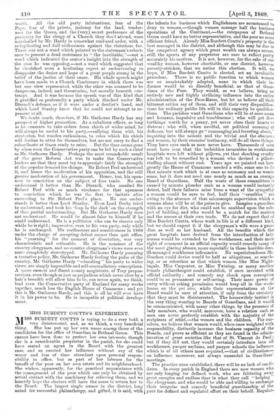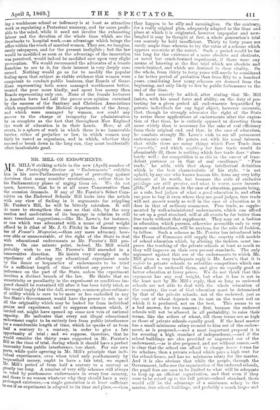MISS BURDETT COUTTS'S EXPERIMENT.
MISS BURDETT COUTTS is trying to do a very bold, a very disinterested, and, as we think, a very beneficial thing. She has put up her own name among those of the candidates for the office of Guardian in Bethnal Green. This cannot have been done to protect her own interests, though she is a considerable proprietor in the parish, for she could have seated an agent in the Board with the greatest ease, and so exerted her influence without any of the worry and loss of time attendant upon personal responsibility in office, but as part of her labours for the benefit of the poor on her own estate and its neighbourhood. She wishes, apparently, for the practical acquaintance with the management of the poor which can only be obtained, by actual contact with the machinery for relieving them, and we heartily hope the electors will have the sense to return her to the Board. The largest single owner in the district, long noted for successful philanthropy, and gifted, it is said, with the talents for business which Englishmen are accustomed to deny to women,—though women manage half the business operations of the Continent,—the ratepayers of Bethnal Green could have no better representative, and the poor no more efficient friend. Already Miss Burdett Coutte's property is the best managed in the district, and although this may be due to the competent agency which great wealth can always secure, still, the agents of any proprietor are sure to reflect pretty accurately his motives. It is not, however, for the sake of one wealthy woman, however charitable, or one district, however poverty-stricken, that we notice this election. It will, we. hope, if Miss Burdett Coutts is elected, set an invaluable precedent. There is no public function to which women are so unmistakably adapted, none in which their influence would be so directly beneficial, as that of Guardians of the Poor. They would, as we believe, bring an, entirely new and highly civilizing influence into the entire administration of the Poor-Rates, but let us believe all their bitterest critics say of them, and still their very disqualifications for ordinary public life will in this capacity be qualifications. The parishes want Guardians who will be at once mean and humane, impulsive and troublesome ; who will get fivefarthings' worth for a penny, yet never close their hearts ta distress ; who will, when needful, set political economy at defiance, but will always go "rummaging and ferreting about," inquiring into the minute and the trivial and the obscure ;. and women, by their enemies' testimony, will do all these things. They have eyes such as men never have. Thousands of men must have seen that the bedridden incurables in workhouse hospitals were left without pillows, yet that shocking crueltywas left to be remedied by a woman who devised a pillow-stuffing almost without cost. Years ago we pointed out how greatly the House of Commons needed a wife, some one to clo• that minute work which is at once so necessary and so wearisome, but it does not need one nearly as much as an average Board of Guardians. Half the waste of these committees is caused by minute plunder such as a woman would instantlydetect, half their failures arise from a want of the sympathy a woman would be sure to feel, half their " cruelties " are owing to the absence of that microscopic supervision which a woman alone will be at the pains to give. Imagine a guardian with an eye for dirt, who could not be snubbed upon the subject of bedding, and who would be a match for the matron and the nurses at their own trade. We do not expect that of Miss Burdett Coutts, whose work in life is of a different kind, but we should expect it if the clergyman's wife were a guardian as well as her husband. All the benefits which the great hospitals have derived from the introduction of lady nurses would be extended to the workhouses, and their mere right of comment in an official capacity would remedy many cf the most glaring abuses, more especially in those horrible dens, ill-managed workhouse infirmaries. No superintendence Mr. Goschen could devise would be half as ubiquitous, as searching, or as relentless as that which women like Miss Nightingale, Miss Carpenter, or Miss Twining, or many another female philanthropist could establish, if once invested with official authority ; and scarcely any check upon corruption could be so permanent or self-acting. Their mere power of entry without asking permission would keep all in the workhouse on the qui vive, while their representations at the Board would be sure of attention, if only from the certainty that they must be disinterested. The housewifely instinct is the very thing wanting to Boards of Guardians, and it would be communicated, with many other things, by the presence of lady members, who would, moreover, have a relation such as men can never perfectly establish with the majority of the recipients of relief,—the women and the children. For ourselves, we believe that women would, when once weighted with responsibility, distinctly increase the business capacity of the and prove as efficient as they are found in the administration of great societies like that of St. Vincent de Paul ; but if they did not, they would certainly introduce into all' workhouses, pauper asylums, and pauper schools the influence which is of all others most required,—that of civilizatiofl—. an influence, moreover, not always unneeded in Guardians meetings.
The practice once established, there will be no lack of candidates. In every parish in England there are now women who
are only longing for defined work, who are frittering avi'ar, great energies and endless time in what they call "helping the clergyman, and who would be able and willing to exchange their irregular and scarcely beneficial guardianship of the poor for defined and regulated effort on their behalf. Regulat lug a workhouse school or infirmary is at least as attractive work as regulating a Protestant nunnery, and far more profitable to the mind, while it need not involve the exhausting labour and the devotion of the whole time which are the drawbacks to hospital work,—an advantage which brings the office within the reach of married women. They are, we imagine, rarely ratepayers, and for the present ineligible ; but the law would be modified as soon as the advantage of the innovation was perceived, would indeed be modified now upon very slight provocation. We would recommend the advocates of a female franchise to see to it, for their interest is very deeply concerned. Nothing would go so far to modify the popular feeling upon that subject as visible evidence that women were competent to conduct public business, that Boards of Guardians representing both sexes managed workhouses better, treated the poor more kindly, and spent less money than Boards representing only one. None of the female lecturers in America have had half the power over opinion exercised by the success of the Sanitary and Christian Associations which supplemented the Medical departments of the Army, and which were managed by women, nor could any answer to the charge of incapacity for administration be so complete as the fact that throughout New England the work of education is in their hands. Here, at all events, is a sphere of work in which there is no immovable barrier, either of prejudice or law, in which women may fairly be tested as organizers, and in which, whether they succeed or break down in the long run, they must incidentally effect incalculable good.



































 Previous page
Previous page